Leavings, Beginnings
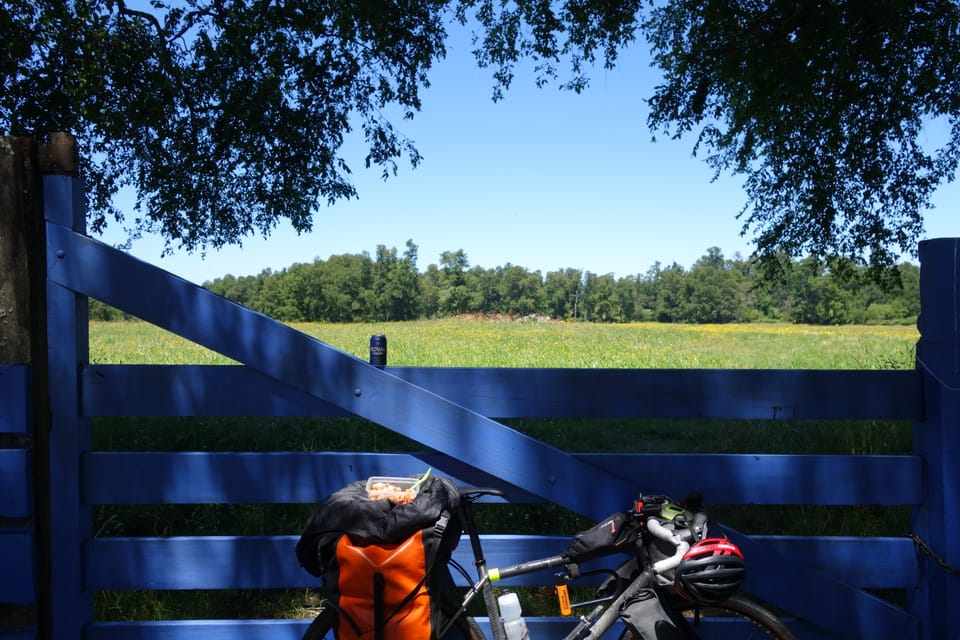
Wow, ok, the mind has really struggled to fall into a blog productive state. I’d said something about a post a month and it’s been over 4 months before a third has landed. It’s not like there’s much of a readership anyways and what there is doesn’t exactly clamour for more. Blessings, perhaps. Continuing the trend (that I’d contemplated disrupting), I’d like to offer you a restricted menu of one for I believe this act is grotesquely underknown. Lucius. Good Grief. Whack on Madness at a volume your neighbours will revile. Turn it down before their envy explodes.
He plucks a bunch of ripe, rich, dark, fat cherries from the tree and presses them into my hand and then points the other way across the thin track bordering the orchard. I turn to find a rough walking path that disappears into a tunnel of overgrowth, and I go. At the bottom of the thickly grown bank willow trees stand within a shingle beach at the river’s edge. There’s not a soul around and the sky is blue, fast birds skimming the water’s surface as they contour downstream. This is my bathtub and I’ve brought my bar of soap. Cycling kit is rinsed and hung to dry. I wade in starkers, making the most of the private tranquility until a disturbance upstream announces a strange craft appearing round the bend. A basic, rigid plastic platform, its three occupants seated in freely swivelling chairs, casting lines, being carried at pace by the current flowing out of Lago Ranco. Who’s to say who found who a more surprising sight?
A mere few days earlier I’d set out along the southern shore of Lago Llanquihue, Chile’s second largest lake after Lago General Carrera (also known as Lago Buenos Aires since it straddles the border with Argentina), aiming for a night up Volcán Osorno, a volcano that vies with Mount Fuji and the like for most visually stunning and is, it turns out, the commonly held demarcation point for Chilean Patagonia. As happens, the clouds closed in and I saw jack. However, as I rode up into the thicker cloud, just after the hairpins that soften the gradient, I stopped to look back down at the lake and was presented with a supernatural display, optical wizardry toying with the elements: out there above the lake was a hole in the grey cloud and bright white sunlight shone through, bouncing off the water’s surface to reflect its ripples on the cloud’s underside. If I were American I’ve seen aliens land. A Chilean employed this UFO as a backdrop to a portrait of a beer can atop a rock. At the ski station the restaurant was packing up for the night and all I could do was refill my bottles, no permission to camp granted. A little ways down I turned for the refuge, visibility poor in the soup. The American style lodge offered a sage overnight option but was a little too much for me considering the anticipation of a free night flaunting the park rules. Feeling awkward I order a hot drink and a generous alfajor, the sweet treat that, at its loosest definition, is an oversized Oreo with dulce de leche (or “manjar” since this is Chile) displacing vanilla cream, but typically has its cookies as two thick crumbly slabs and is all encased in chocolate a thickness of which McVities executives would despair and a cyclist’s metabolism relishes. I dry my feet holding them towards the wood-burning stove. Begrudgingly I leave, descending through volcanic debris, past a “Beware Pumas” sign, halfway back to a mirador where there’s a sheltered area back from the road where I can pitch my tent. It’s a no wash night, something I’m not keen to make a habit. It’s also leftovers night, polishing off a black sausage and peppermint empanada and another more conventionally flavoured. In the morning I make the staple coffee and porridge before descending back to the lakeside to twist and turn along its eastern edge, drizzle not yet abating. A mid-morning snack of smoked salmon empanada frita with a cuppa at a roadside stall fuels me towards a lunch of round two porridge sheltering l in a bus stop. By mid-afternoon a heatwave is being ushered in and rain won’t feature for weeks. Fires will burn up and down the country and even the European press will notice as homes and lives are lost around the coastal city of Valparaiso.
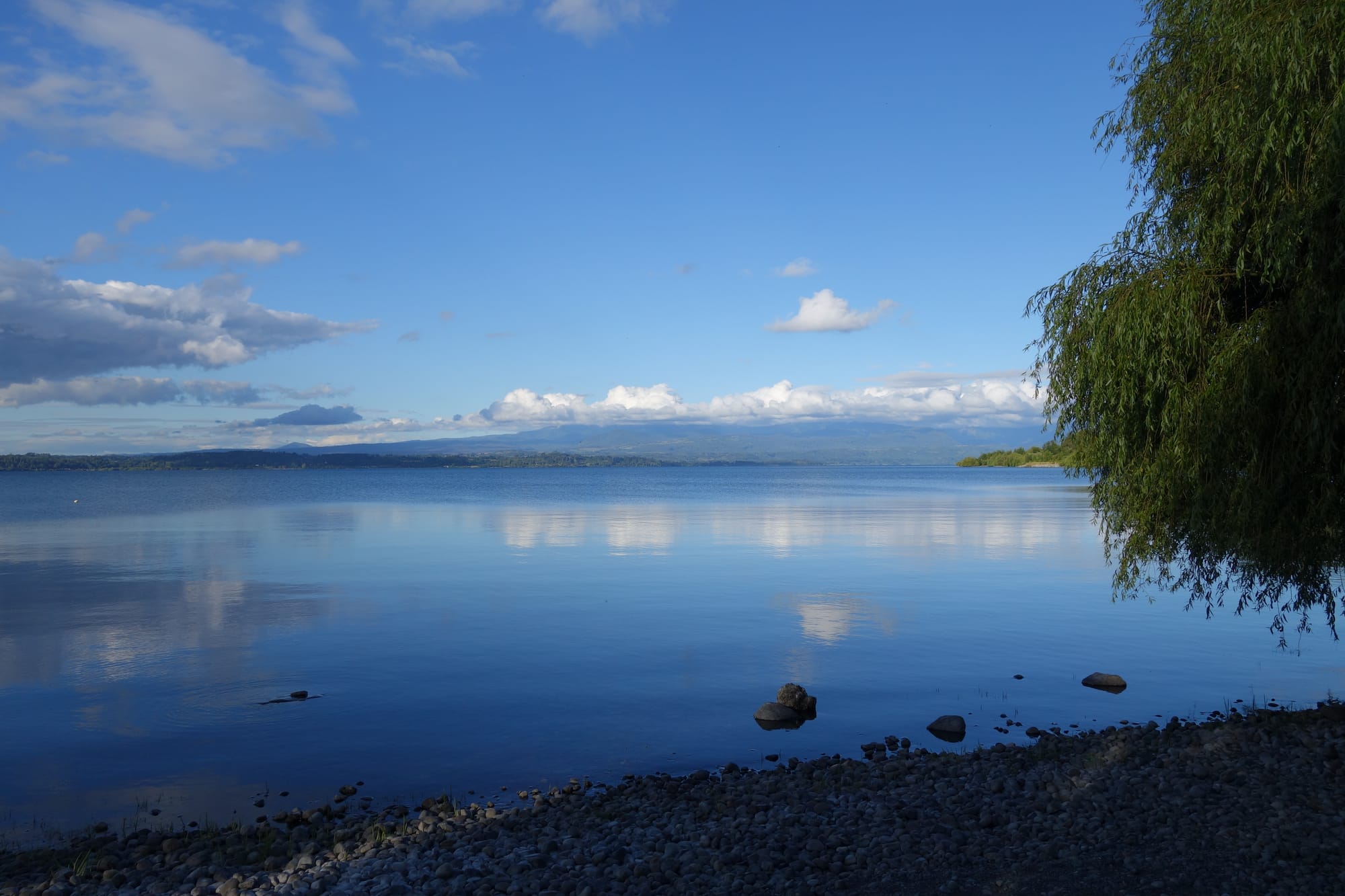
I cycle for 8 days straight, in a pattern which will oft be repeated. Leave, begin, and begin hard to forget, to distract. I’m writing this two months on, at the end of the road to Paradise; yes, this means this is Paradise and there’s a river running through it. Yesterday I swam and stood in that river, known as El Claro (The Clear) it smashes into El Turbio (The Turbid, the cloudy one) at the valley junction, playing a chaotic game of Tetris as they reconcile to go irrigate the grapes, oranges and papaya on the widening valley floor. There’s a dam halfway to La Serena, the coastal capital of Coquimbo, with a spillway that’s been superfluous for a decade. As you drive around the edge of the drought-dried laguna you encounter the displaced valley villages, relocated to higher ground, and they now look down on their previous steadings with a gentle mocking irony. The football field in Villa Puclaro, emblazoned with a coloured stone “ROBERT KENNEDY”, is crumbly stone and dust, a subdued Wes Anderson brown apposite to the thorn-tree damned basin. Goats graze and pick-up trucks meander down the old road. Windsurfing was a tourist pull, now they only have the wind pushing uphill strengthening its long-arm as it goes, checking downwards progress: there is no “free descent” on an Andean crossing.
There is no water shortage in Paradise. Irrigation canals have historically been cut into the mountainsides here, whether slave-procured spoken record does not relay. The Incas did not reach across the Andes here, preferring instead a southwards advance towards the Steppe, thwarted by Mapuche in modern-day Chile.
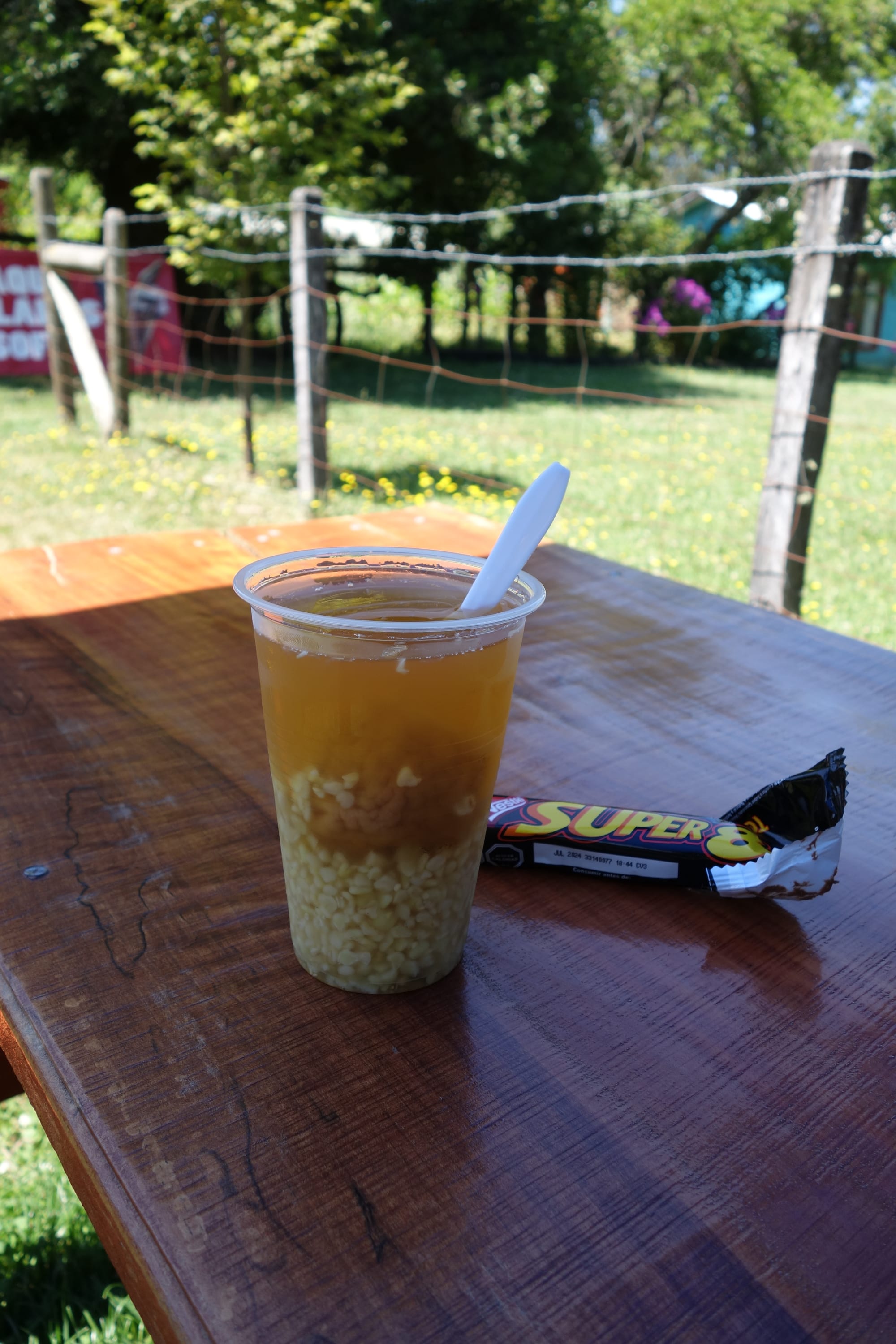
The first outward Mapuche signals, by way of bus-stop graffiti, were on the back roads to the north of Conguillío, the national park made blackened barren by an upset volcano and vegetation rich by the famous Araucaria, affectionately and otherwise known as the “Monkey Puzzle” tree. Cycling up a black sand, element-exposed road during a summer-defining ola de calor is scratchily recommended. But I know what post-apocalyptic, dystopian landscape I can bear, in which I could find solace, and it’s this, a stratovolcanic-spewed lumpy aerated-rock-infested silica-dust-infilled sun-absorbing bilged disorder of Earth’s innards. It’s handsome in its shock-and-awe nastiness. I love it and my feet hate it; their tops burn by the lake that looks onto Sierra Nevada, a deceptive addition to the local pyrotechnic abilities it looks like an ordinary mountain range. Llaima is the guilty party. It last erupted in 2009. And that does not make it the latest.
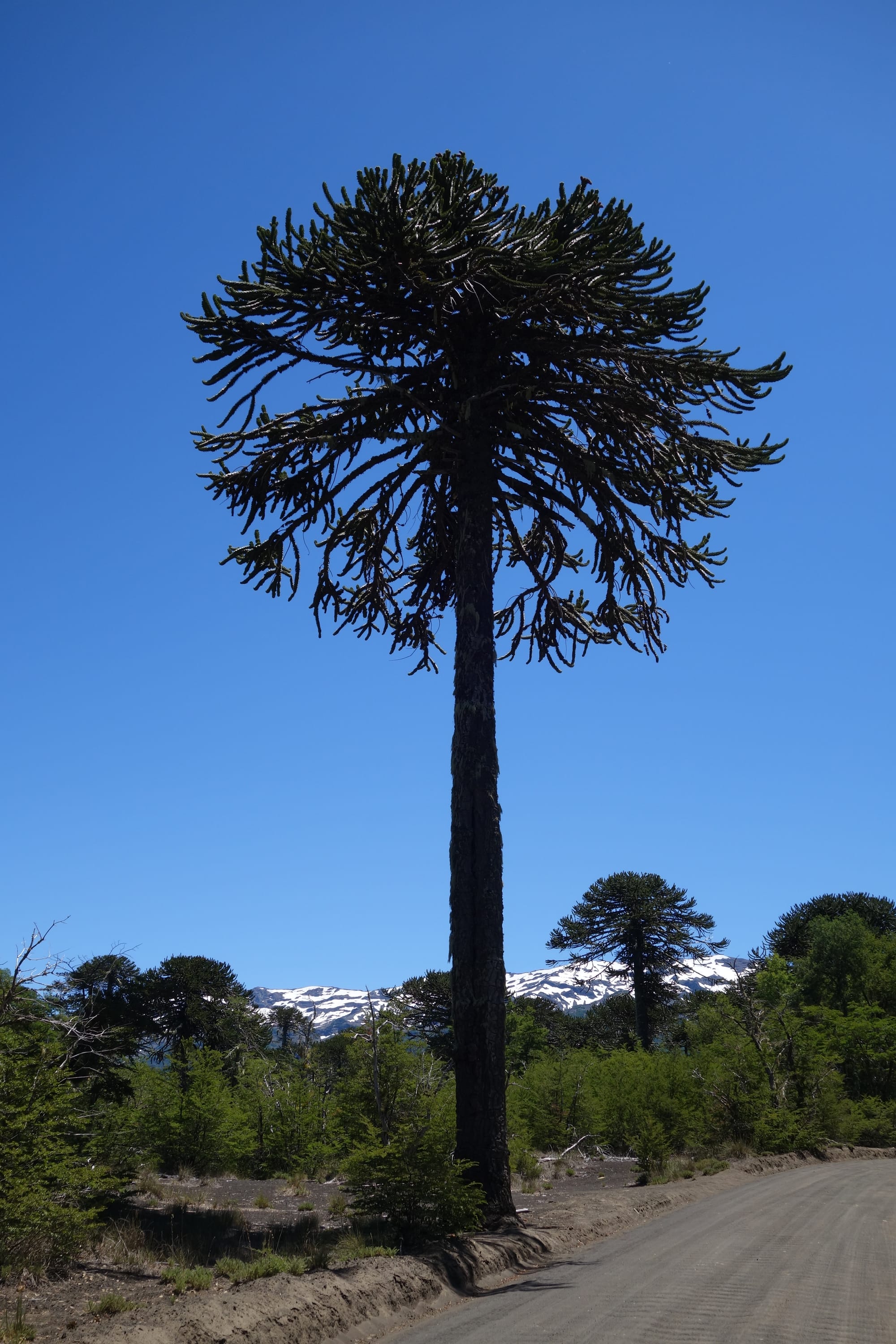
That title belongs to Puyehue. This Carlos Oporto taught me. No shit, Sherlock, he’s originally from Portugal. And he’s the curator of cherries, both sweet and sour. A quirk of iOverlander, guiding you to an “informal” campsite, his home, his fundo nested atop a river gorge winding into Lago Ranco. You pay to stay, though I never ask if he’s wondered why random people are contacting him to camp on his tree-shaded lawn; his starting quote is painfully high, a carbon-copy of a recent transaction with a camper van and its occupying couple, unblinking he barters himself down to a palatable sum. In the morning he welcomes me in for coffee brewed in his samovar, plying me with a second breakfast of bread and homemade jams. He’s short of stature, sure of gaze. His long, almost black hair is tied to a missable ponytail as it’s his dark eyes, bushily-bordered, that dominate. Before leaving I ask to take a portrait and I’m left with the impression that either he’s done this before or his demeanour is naturally inclined to the Balenciaga triangle of sadness. Carlos has a son. He lives with his mother in Lucerne, Switzerland, and works apprentice-style for Schindler. Carlos tells me that the Swiss are the big landowners around here, ringing a reminder of another separated couple’s man telling me similar, axlessly informing me that it’s the Swiss that own all the land around Lago Llanquihue. But it’s the Germans that reveal themselves, thankfully contributing positively to a generally low-ranking national cuisine. Kuchen. Around Lago Ranco there’s a particular family that rules, the honey magnete Rodolfo Klaassen. I haven’t looked closely enough at supermarket honey pots.
It’s the chocolate aisle that was attention-grabbing back in December and January. Sahne-Nuss, another German name, this time for a Nestle wonder of milk-chocolate encased almond goodiness, a worldly wonder that’s confined to this stick thin, Jacky-beanstalked slice of land between sea and peak. Nestle, export the gold!
Those 8 days from Puerto Varas to Pucon featured the great turf war. A turf war for farm signage. Colun versus Nestlé. A molestation for milk. “Molestar” having become my Spanish palabra profunda - sorry, this barely makes sense, squint and you’ll be fine. Molestar meaning annoy, trouble, tease. Molestar meaning aggravate. An aggravation of agriculture.
After Pucón I embrace another 8 day slogathon that includes the toughest climb I’ve ever ridden. And the most surprising, most unexpected. Between Lago Villarica and Lago Cólico there’s a ridge that at least 3 roads trespass. The map flags a mirador, lulling me into the clutches of the most godforesaken gravel grind this side of Hell. Near its spotty-arsed bottom a laden lorry has taken out a concrete telephone pole, bringing out carabinero paper-shufflers and nought in the way of recovery vehicle. So I’m alone with my sunset-approaching shadow. I walk more on that one climb, which turned out to be half the vertical meterage I quoted to anyone that’d listen, than the entire Carretera Austral. And the descent is another beast to wrestle, snagging and snatching the front tyre, daring to catapult you and impale you on whatever vicious vegetative vaulting spike it feels appropriate. With the sun lowered to a blinding angle the dust achieves ethereality. Having not seen man or machine since the incident I’m suddenly thrust out onto a spanking new tarmac road, a lane each way. The end of the road. That pass really had trespassed. I feel like a Hero of old. The teenage girls walking the other way, to the Chilean equivalent of an oligarch’s dacha, offer scant regard. That evening at a working man’s campsite neighbours recognise my heroics with a plate of barbecued sustenance, though really it’s an excuse for their poor music taste blasting nature into apology.
Pucón was easy to leave. It’d been a brief interlude, just a day off the bike for a failed attempt at laundry. And its Spring Break vibes killed me, freed me to ditch the place ASAP and run for the hills. In general, however, I’ve struggled at leaving. You grow accustomed, you meet, you chat, you start to know. And then you rip yourself away, the best way being to blast out a beginning. Big mileage. Big climb. Big hurt.
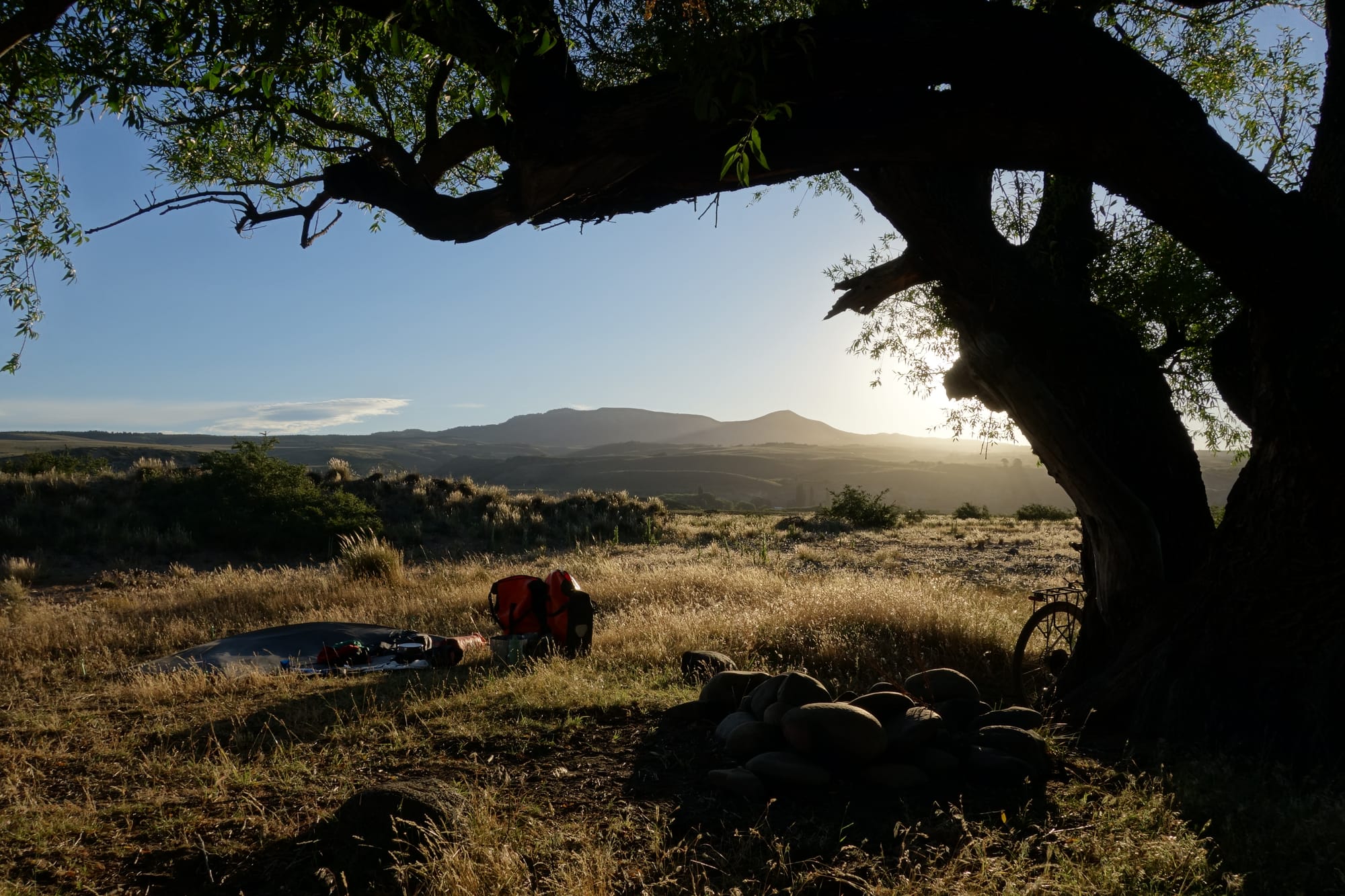
A fortnight ago I tore myself from Mendoza, throwing myself at the 52 that winds relentlessly upwards onto the top of a baby range parallel and distinct from the Andes proper, a completely unnecessary addition to the journey to Uspallata. Except that it is necessary. Necessary to wholly distract from what you’re leaving, to create a renewed sense of purpose, of adventure. With my bike having only become available for collection that morning I so easily could have been tempted by reason, by sensibly and responsibility, to stay another night, delay departure, have another glass of cooled Malbec. Sensibility is a gateway drug to package holidays and packaged memories. So instead I found myself sketchily descending a sandy gravel track after dark. Idiot. I’d intended to camp but had no clue where I was and rolled into the first possibility to enquire, tent-pitching rejected but a cabaña for the princely price tag of 10,000 ARS (£8), I felt like a hero once again. (My heart rate refused to fall below 59 bpm that night.) You don’t get that for sensibility.
Being honest I’ll now admit that I did try to leave Mendoza a fortnight before and failed. I made it as far as lunch on the outskirts before retreating to comforts. The hostel wine had been an error exacerbating the loneliness. It had also given me a hangover, the first and so far only since home: I’m convinced a heightened metabolism is playing the role of the good nurse.
Leaving Puerto Varas was hard. That first stretch was full of reminders of what had been and had been shared. It didn’t help that the weather wore its late November guise of damp urgh and the bike threw up a puncture to mirror my early tyre wobbles. To ease myself I pulled up at the same overpriced coffee truck, not that we knew it was overpriced before but now I’m dialled in I’m here for the man’s kindness and the symmetry of memory.
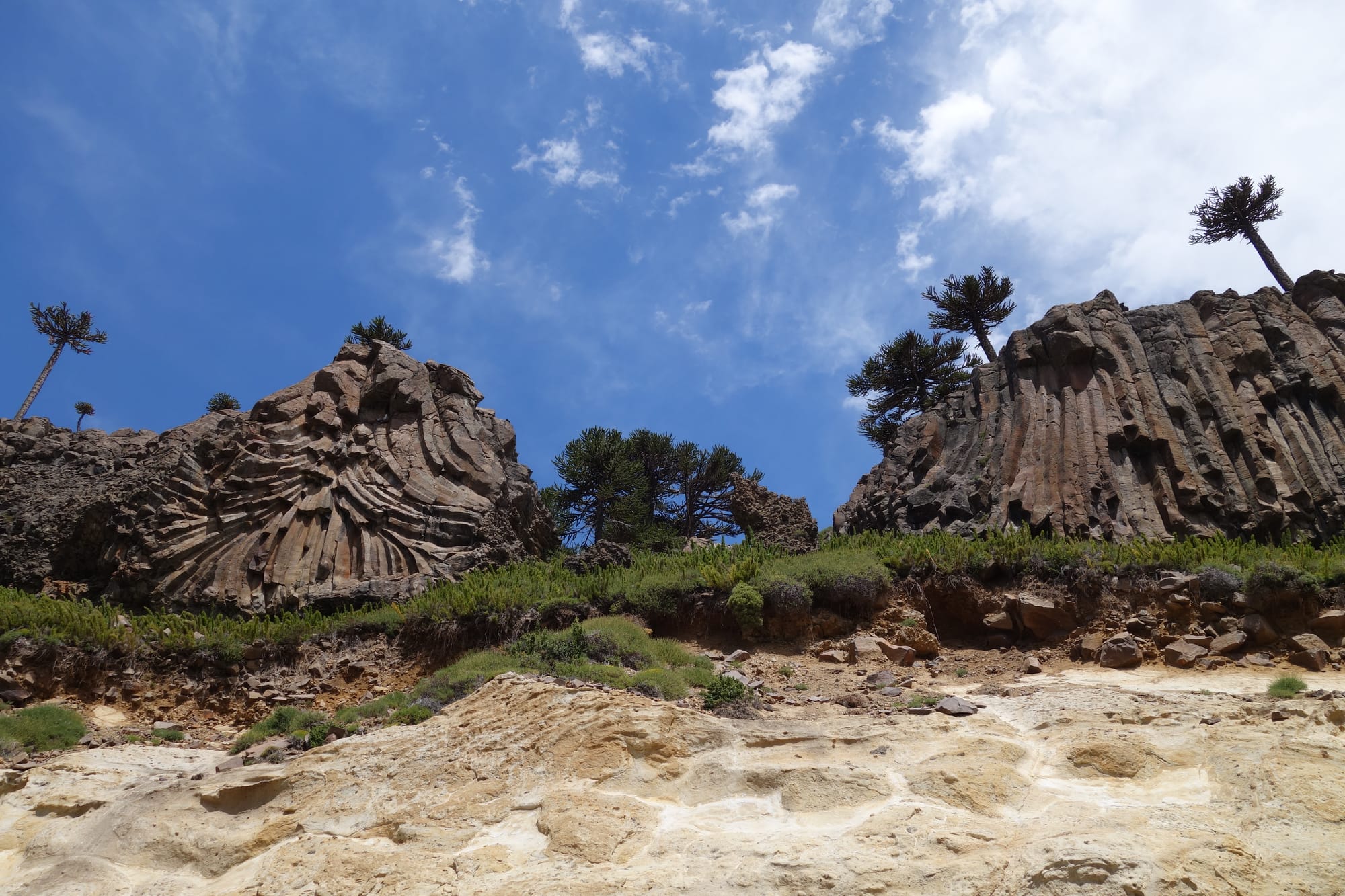
Here in Paradise I’ve just been down to the river. Rob told me on his tour of the parcela that when friends visit following a family bereavement they can and do sit down there for hours. I’m not bereft. I’m full. Replete. I’m ready as I’ll ever be. To begin. It’s a month to Salta, to Rufus and a holiday from the holiday, a tour around coloured rocks, salt flats, high mountains, squiggly roads and long straights. That’ll be hard to leave too. But again, I’ll begin.
Reading: A.A. Gill’s Pour Me